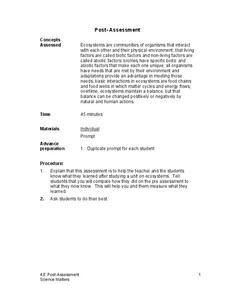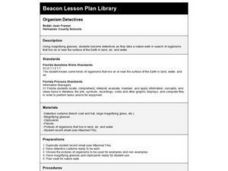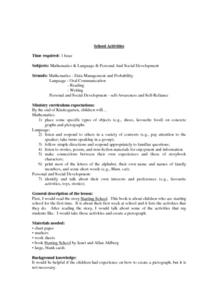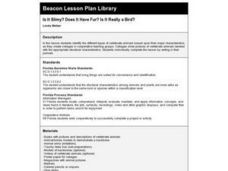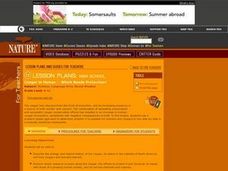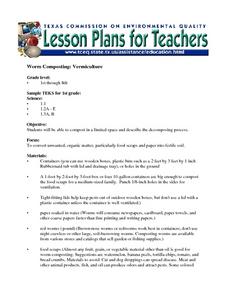Science Matters
Post-Assessment
Twenty questions make up an assessment designed to test super scientists' knowledge of ecosystems. Scholars answer multiple-choice and short-answer questions about organisms, food chains, energy flow, and more.
Curated OER
Organism Detectives
First graders take a nature walk and search for organisms. They use magnifying glasses to see things that live on or near the surface of the Earth in land, air, and water.
Curated OER
How Do Organisms Reproduce
Middle schoolers examine the difference between mitosis and meiosis, and describe the steps involved in meiosis and the significance of each step. They create a diploid nucleus containing two pairs of chromosomes using clay.
Curated OER
Curiosity Does Not Kill The Cat
Students list the different ways they could test a guinea pig, a dandelion, and their brother (or sister)? They create a data chart in their group that lists the organism, what they could measure, and how they could change that measurement.
Science Matters
Ecosystem Pre-Assessment
Test scholars' knowledge of ecosystems with a 20-question pre-assessment. Assessment challenges learners to answer multiple choice questions, read diagrams, and complete charts.
Curated OER
School Activities
First graders place some specific types of objects (e.g., shoes, favorite food) on concrete graphs and pictographs. They listen and respond to others in a variety of contexts (e.g., pay attention to the speaker; take turns speaking in a...
Curated OER
Where Do I Belong?
Tenth graders study the diversity of life in the world. They classify and sketch organisms into the 6 kingdoms.
Curated OER
How Germs Spread
Students conduct a test to help them visualize the spread of
germs. They identify that a pandemic is an epidemic (an outbreak of an infectious disease) that spreads across a large region or even worldwide. Finally, students state...
Curated OER
Worm Composting: Vermiculture
Students compost in a limited space and describe the decomposing process. Students convert unwanted, organic matter, particularly food scraps and paper into fertile soil.
Curated OER
Introduction to Adaptation
Tenth graders observe collections of specimens and discuss their answers to provided questions. They explore common ancestry, homology, analogy, adaptive radiation, and evolution, while formulating creative answers based on their...
Curated OER
Pollution Search
First graders identify forms of pollution and describe effects that various pollutants can have on people, wildlife, and plants; students describe relationships between various forms of pollution and human actions.
Curated OER
Changing Cicada
Students discuss inherited traits and relate to the inherited traits in a cicada. For this cicada lesson, students follow the life cycle of the cicada and observe the changes as it grows. Students discuss the characteristics of the...
Curated OER
Clipbirds
Students attempt to pick up various objects with a wide variety of beaks, including scissors, spoons, etc.
Curated OER
Is It Slimy? Does It Have Fur? Is It Really a Bird?
Sixth graders identify the different types of vertebrate animals based upon their major characteristics, as they create collages in groups. Collages show pictures of vertebrate animals labeled with the appropriate structural...
Curated OER
Comparing Ovaries And Testes
For this reproductive system worksheet, students compare specimens of rat ovaries and testes. They complete 5 short answer pre-lab questions, follow an 11 step procedure and answer 5 analysis questions.
Curated OER
Cougar or Human: Which Needs Protection?
Students conduct Interned research on the cougar, listing perceptions about cougars, and facts about cougars. They view a video, take notes during the video, and organize presentations to present their findings.
Curated OER
Dinosaurs 1: Where Are the Dinosaurs?
Students explore dinosaurs. In this dinosaur identification lesson plan, students watch video clips for different dinosaurs from the Discovery Kids website. Students discuss the clips with their teacher. Students may then role play the...
Curated OER
Worm Composting: Vermiculture
Students set up their own composting bin. They observe and record their findings during a period of time. They describe the decomposing process as well.
Curated OER
Physics 210: 24
For this physics 210 worksheet, students answer the question of the predicted modes of oscillations heard based on the information provided in the word problems. Students apply their understanding of sound waves to answer the questions...
Curated OER
March Market
Students role play a living wetland food web. They trace the food web associated with the items in their lunch.


